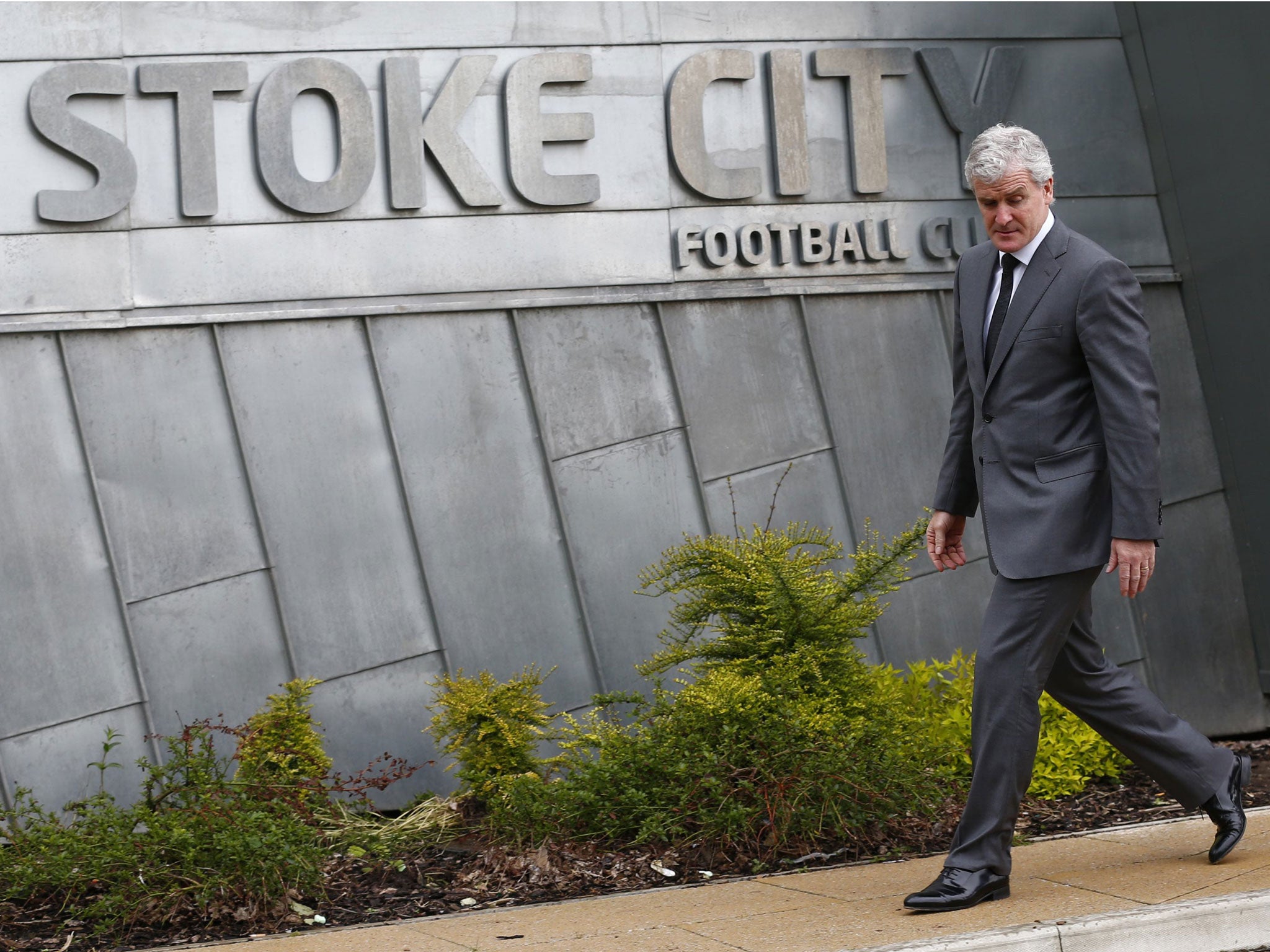The work's already done for Mark Hughes at Stoke
The Potters have stayed up and the new manager is not under pressure from wild ambition

Your support helps us to tell the story
From reproductive rights to climate change to Big Tech, The Independent is on the ground when the story is developing. Whether it's investigating the financials of Elon Musk's pro-Trump PAC or producing our latest documentary, 'The A Word', which shines a light on the American women fighting for reproductive rights, we know how important it is to parse out the facts from the messaging.
At such a critical moment in US history, we need reporters on the ground. Your donation allows us to keep sending journalists to speak to both sides of the story.
The Independent is trusted by Americans across the entire political spectrum. And unlike many other quality news outlets, we choose not to lock Americans out of our reporting and analysis with paywalls. We believe quality journalism should be available to everyone, paid for by those who can afford it.
Your support makes all the difference.Managers, like players, eventually find their level. Neil Warnock and, before him, Dave Bassett were expert at taking teams into the top flight but found it harder keeping them there; less heralded colleagues such as Gary Johnson, Russell Slade and John Still do outstanding work in the lower divisions. Now Mark Hughes has moved in at Stoke City to confirm he is the man to keep overachieving clubs in the middle of the Premier League.
It is a feat he performed admirably at Blackburn and Fulham. At Manchester City and Queens Park Rangers he found clubs wanting to move faster than was comfortable for any manager, and admits to becoming caught up in all the excitement. To have Blackburn sixth, 10th and seventh while reaching three cup semi-finals and to take Fulham to eighth place, however, was the mark of a man who knows what he is doing, and it is the Fulham parallel he has chosen to invoke.
"This is very similar to the situation when I took over at Fulham," he said. "Roy Hodgson had done a fantastic job, it is difficult to follow someone who has been successful, but it gives you a real opportunity, because things are in place and working and it gives you a chance to work well yourself.
"That is what I found at Fulham and it is what I expect here. If you go into a situation where it is difficult, there are a lot of things that take your energy away from you."
At Blackburn and QPR the initial difficulty was a relegation battle, successfully won each time; at Fulham, Hodgson had won that struggle already, while Tony Pulis has claimed to be leaving Stoke after "probably the most successful seven years in the club's history". But for all the admirable consistency – 12th, 11th, 13th, 14th and 13th in the League – the Potters' wheel was functioning less smoothly and paying customers were finding cracks.
Pulis's direct, physical style was acceptable while it worked, and Jon Walters, signed from Ipswich three seasons ago, was one of the players who appreciated what he did for the club: "Tony's done a magnificent job from a mid-table Championship team to staying up in the Premier League and pushing on, a few good cup runs, a European run, and he'll be a hard act to follow. Once you achieve something, there are certain expectations you have to fulfil and if we weren't doing that, then there were a few moans and groans.
"We did go on a bad run after the Liverpool game on Boxing Day. But we stayed in the Premier League and that's magnificent for the club, and hopefully we can push forward next year under the new manager."
As a Republic of Ireland international, Walters is one of few players at Stoke with genuine resale value, which is something Hughes must address, along with a shortage of local players graduating from the club's academy.
"The intention is to have a close look at what is coming through the academy and the development teams and see if we can bring more players through," Hughes said. "That is always important, it is good for the club, because fans want to see local lads coming through the ranks.
"We will try to make that happen if the quality is there, but it is not a case of trying to bring a number of players in, because the group is good enough. We want to add a bit of quality where it is needed."
Jack Butland, the highly regarded England Under-21 goalkeeper, has already been secured from Birmingham, which may mean allowing Asmir Begovic to leave. Hughes will try to insist that others such as Ryan Shawcross stay where they are.
"It is not sustainable if you come in and sell your better players because that just undermines what you are trying to do. If you have a recruitment strategy that is correct and you can see two or three years ahead, that enables you to have a plan. So if you do get to a point where a player is agitating to leave, then you have had two years of working with the player who might replace him. That is what we will create in the future."
Looking "two or three years ahead" has become a precarious strategy in a League where the average tenure for managers is now much lower. Changing the style of football at the same time as achieving results makes life more difficult, but Hughes has always believed in himself.
"It's understandable at times that you have self-doubt," he admitted. "That comes and goes, but you have to be strong in your own mind and remind yourself sometimes what you have achieved."
Join our commenting forum
Join thought-provoking conversations, follow other Independent readers and see their replies
Comments